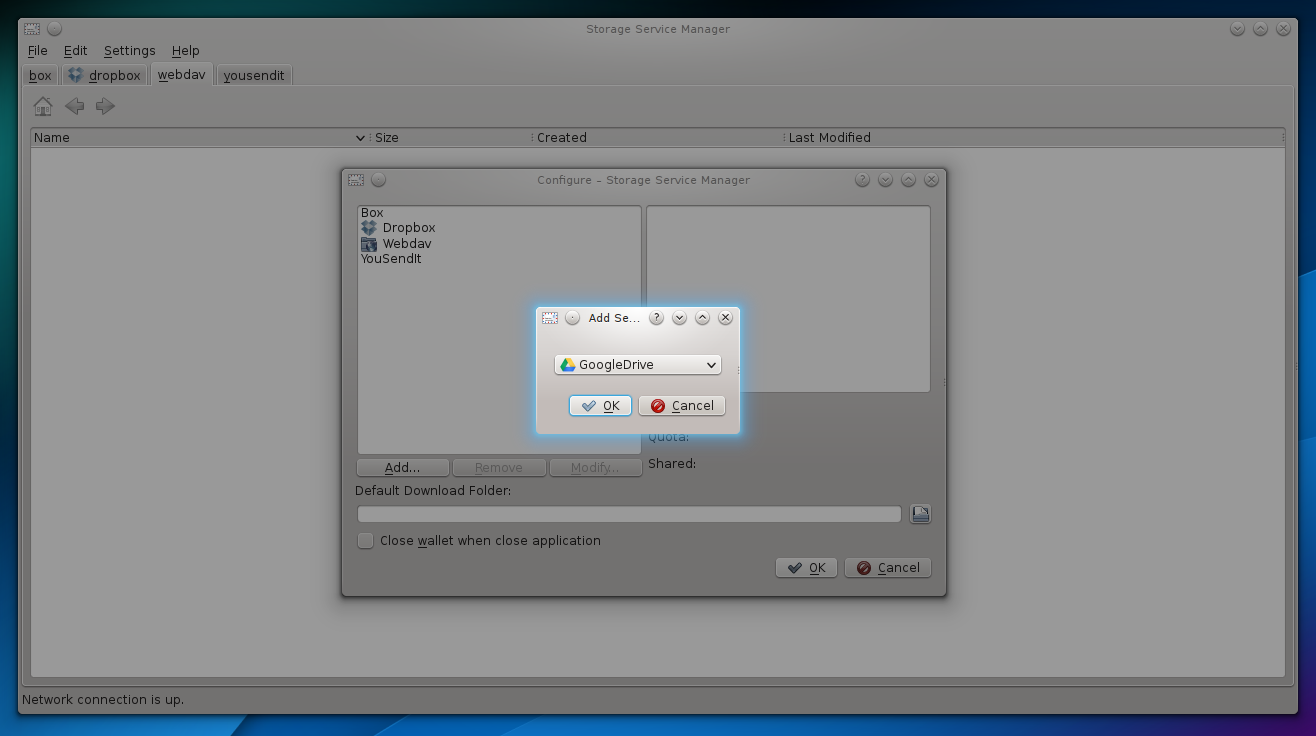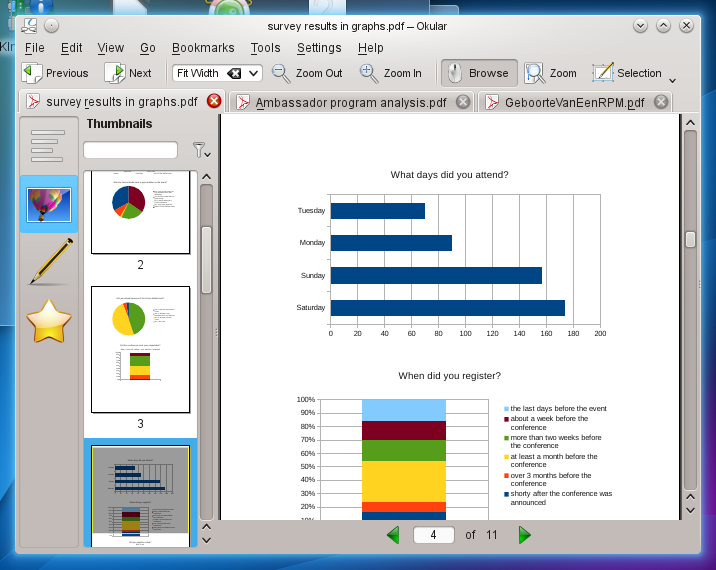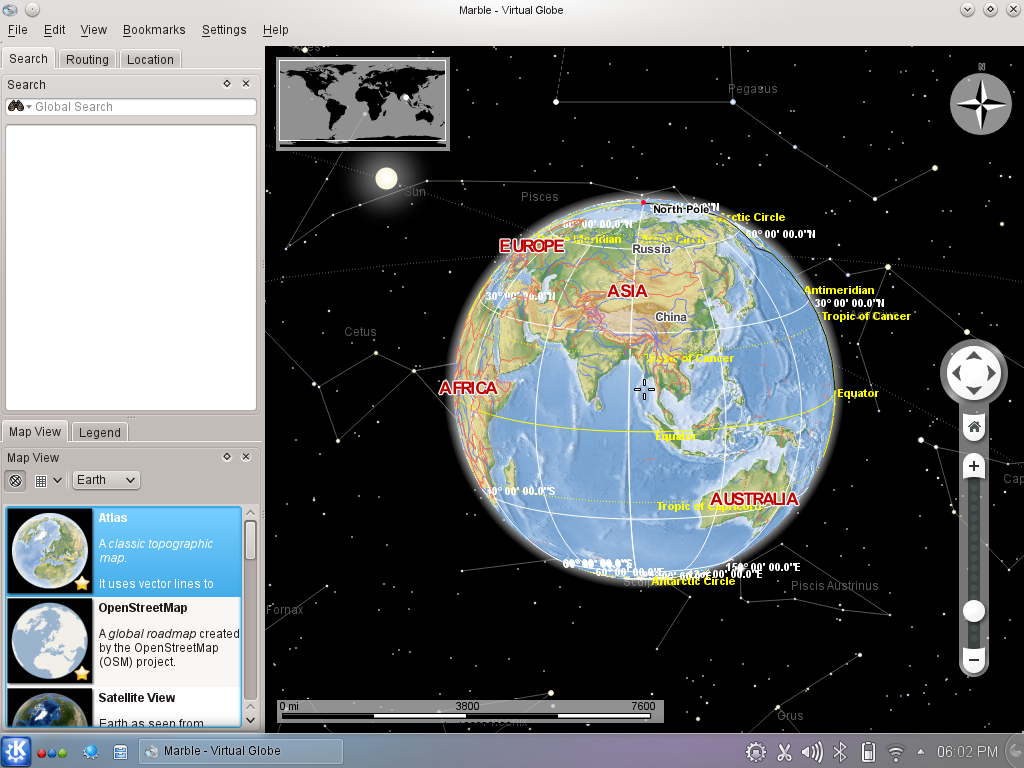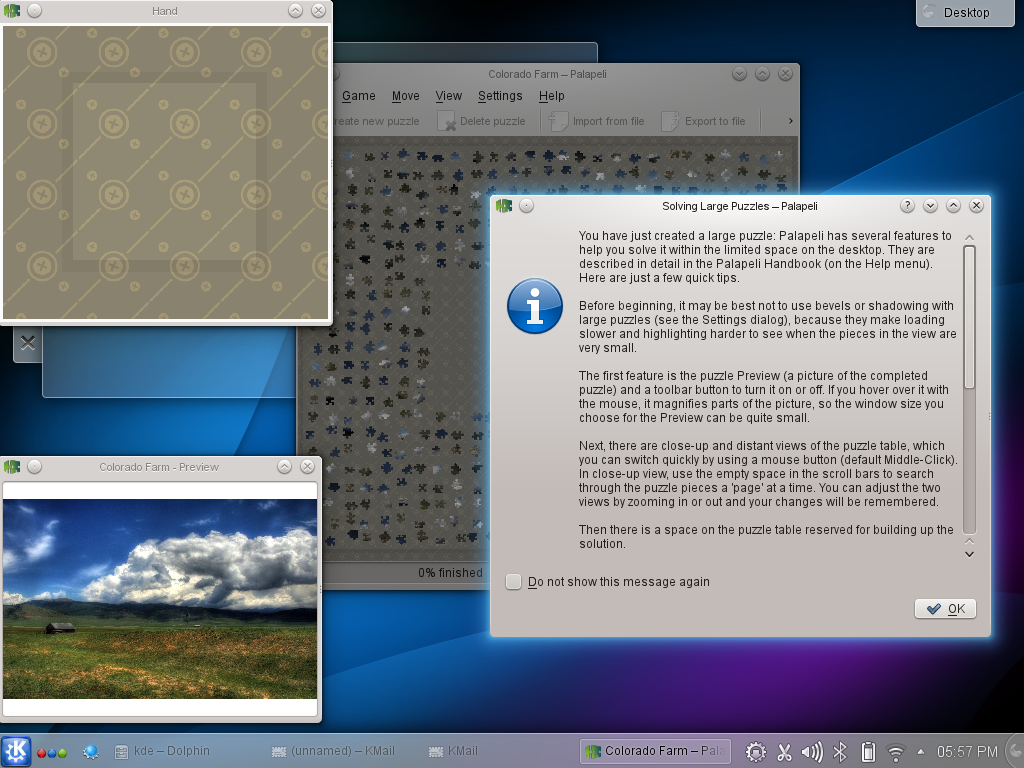KDE Applications 4.13 Benefit From The New Semantic Search, Introduce New Features
Sreda, 16. april 2014
The KDE Community is proud to announce the latest major updates to the KDE Applications delivering new features and fixes. Kontact (the personal information manager) has been the subject of intense activity, benefiting from the improvements to KDE's Semantic Search technology and bringing new features. Document viewer Okular and advanced text editor Kate have gotten interface-related and feature improvements. In the education and game areas, we introduce the new foreign speech trainer Artikulate; Marble (the desktop globe) gets support for Sun, Moon, planets, bicycle routing and nautical miles. Palapeli (the jigsaw puzzle application) has leaped to unprecedented new dimensions and capabilities.

KDE Kontact Introduces New Features And More Speed
KDE’s Kontact Suite introduces a series of features in its various components. KMail introduces Cloud Storage and improved sieve support for server-side filtering, KNotes can now generate alarms and introduces search capabilities, and there have been many improvements to the data cache layer in Kontact, speeding up almost all operations.
Podpora za shranjevanje v oblaku
KMail introduces storage service support, so large attachments on can be stored in cloud services and included as with links in email messages. Supported storage services include Dropbox, Box, KolabServer, YouSendIt, UbuntuOne, Hubic and there is a generic WebDav option. A storageservicemanager tool helps with the managing of files on these services.

Much Improved Sieve Support
Sieve Filters, a technology to let KMail handle filters on the server, can now handle vacation support for multiple servers. The KSieveEditor tool allows users to edit sieve filters without having to add the server to Kontact.
Druge spremembe
The quick filter bar has a small user interface improvement and benefits greatly from the improved search capabilities introduced in the KDE Development Platform 4.13 release. Searching has become significantly faster and more reliable. The composer introduces a URL shortener, augmenting the existing translation and text snippets tools.
Tags and annotations of PIM data are now stored in Akonadi. In future versions, they will be also stored in servers (on IMAP or Kolab), making it possible to share tags across multiple computers. Akonadi: Google Drive API support has been added. There is support for searching with 3rd party plugins (which means that results can be retrieved very quickly) and server-search (searching items not indexed by a local indexing service).
KNotes, KAddressbook
Significant work was done on KNotes, fixing a series of bugs and small annoyances. The ability to set alarms on notes is new, as is searching through notes. Read more here. KAdressbook gained printing support: more details here.
Izboljšave učinkovitosti delovanja
Kontact performance is noticeably improved in this version. Some improvements are due to the integration with the new version of KDE’s Semantic Search infrastructure, and the data caching layer and loading of data in KMail itself have seen significant work as well. Notable work has taken place to improve support for the PostgreSQL database. More information and details on performance-related changes can be found in these links:
- Storage Optimizations: sprint report
- speed up and size reduction of database: mailing list
- optimization in access of folders: review board
KNotes, KAddressbook
Significant work was done on KNotes, fixing a series of bugs and small annoyances. The ability to set alarms on notes is new, as is searching through notes. Read more here. KAdressbook gained printing support: more details here.
Okular z izboljšanim uporabniškim vmesnikom
This release of the Okular document reader brings a number of improvements. You can now open multiple PDF files in one Okular instance thanks to tab support. There is a new Magnifier mouse mode and the DPI of the current screen is used for PDF rendering, improving the look of documents. A new Play button is included in presentation mode and there are improvements to Find and Undo/Redo actions.

Kate introduces improved statusbar, animated bracket matching, enhanced plugins
The latest version of the advanced text editor Kate introduces animated bracket matching, changes to make AltGr-enabled keyboards work in vim mode and a series of improvements in the Kate plugins, especially in the area of Python support and the build plugin. There is a new, much improved status bar which enables direct actions like changing the indent settings, encoding and highlighting, a new tab bar in each view, code completion support for the D programming language and much more. The team has asked for feedback on what to improve in Kate and is shifting some of its attention to a Frameworks 5 port.
Razne funkcionalnosti vsepovsod
Konsole brings some additional flexibility by allowing custom stylesheets to control tab bars. Profiles can now store desired column and row sizes. See more here.
Umbrello makes it possible to duplicate diagrams and introduces intelligent context menus which adjust their contents to the selected widgets. Undo support and visual properties have been improved as well. Gwenview introduces RAW preview support.

The sound mixer KMix introduced remote control via the DBUS inter-process communication protocol (details), additions to the sound menu and a new configuration dialog (details), and a series of bug fixes and smaller improvements.
Dolphin's search interface has been modified to take advantage of the new search infrastructure and received further performance improvements. For details, read this overview of optimization work during the last year.
KHelpcenter adds alphabetical sorting for modules and category reorganization to make it easier to use.
Games and educational applications
KDE's game and educational applications have received many updates in this release. KDE's jigsaw puzzle application, Palapeli, has gained nifty new features that make solving large puzzles (up to 10,000 pieces) much easier for those who are up to the challenge. KNavalBattle shows enemy ship positions after the game ends so that you can see where you went wrong.

KDE's Educational applications have gained new features. KStars gains a scripting interface via D-BUS and can use the astrometry.net web services API to optimize memory usage. Cantor has gained syntax highlighting in its script editor and its Scilab and Python 2 backends are now supported in the editor. Educational mapping and navigation tool Marble now includes the positions of the Sun, Moon and planets and enables capturing movies during virtual tours. Bicycle routing is improved with the addition of cyclestreets.net support. Nautical miles are now supported and clicking a Geo URI will now open Marble.
Nameščanje aplikacij KDE
Programska oprema KDE, vključno z vsemi knjižnicami in aplikacijami, je prosto na voljo pod odprto-kodnimi licencami. Programska oprema KDE deluje na različnih konfiguracijah strojne opreme in arhitekturah CPE, kot sta ARM in x86, operacijskih sistemih in deluje s kakršnim koli upravljalnikom oken ali namiznim okoljem. Poleg Linuxa in drugih operacijskih sistemov, ki temeljijo na sistemu UNIX, lahko najdete različice večine aplikacij KDE za Microsoft Windows na spletnem mestu Programska oprema KDE za Windows in Apple Mac OS X različice na Programska oprema KDE na spletnem mestu Mac. Eksperimentalne različice aplikacij KDE za različne mobilne platforme, kot so MeeGo, MS Windows Mobile in Symbian, je mogoče najti na spletu, vendar trenutno niso podprte. Plasma Active je uporabniška izkušnja za širši spekter naprav, kot so tablični računalniki in druga mobilna strojna oprema.
KDE software can be obtained in source and various binary formats from download.kde.org and can also be obtained on CD-ROM or with any of the major GNU/Linux and UNIX systems shipping today.
Paketi
Some Linux/UNIX OS vendors have kindly provided binary packages of 4.13.0 for some versions of their distribution, and in other cases community volunteers have done so.
Mesta paketov
For a current list of available binary packages of which the KDE's Release Team has been informed, please visit the Community Wiki.
The complete source code for 4.13.0 may be freely downloaded. Instructions on compiling and installing KDE software 4.13.0 are available from the 4.13.0 Info Page.
Sistemske zahteve
In order to get the most out of these releases, we recommend to use a recent version of Qt, such as 4.8.4. This is necessary in order to assure a stable and performant experience, as some improvements made to KDE software have actually been done in the underlying Qt framework.
In order to make full use of the capabilities of KDE's software, we also recommend to use the latest graphics drivers for your system, as this can improve the user experience substantially, both in optional functionality, and in overall performance and stability.
O KDE
KDE je mednarodna tehnološka ekipa, ki ustvarja prosto in odprtokodno programsko opremo za namizno in prenosno računalništvo. Med izdelki KDE so sodoben namizni sistem za platformi Linux in UNIX, celoviti paketi za pisarniško produktivnost in skupinsko programje ter na stotine naslovov programske opreme v številnih kategorijah, vključno z internetnimi in spletnimi aplikacijami, večpredstavnostjo, zabavo, izobraževanjem, grafiko in razvojem programske opreme. Programska oprema KDE je prevedena v več kot 60 jezikov in je zgrajena z upoštevanjem enostavne uporabe in sodobnih načel dostopnosti. Aplikacije KDE s polnimi funkcijami delujejo izvorno v sistemih Linux, BSD, Windows, Haiku in macOS.
Obvestila o blagovnih znamkah.
KDE® in logotip the K Desktop Environment® sta blagovni znamki KDE e.V..
Linux je registrirana blagovna znamka Linusa Torvaldsa. UNIX je registrirana blagovna znamka The Open Group v ZDA in drugih državah.
Vse druge blagovne znamke in avtorske pravice, omenjene v tej objavi, so last njihovih lastnikov.
Stiki za novinarje
Za več informacij nam pošljite e-pošto: press@kde.org